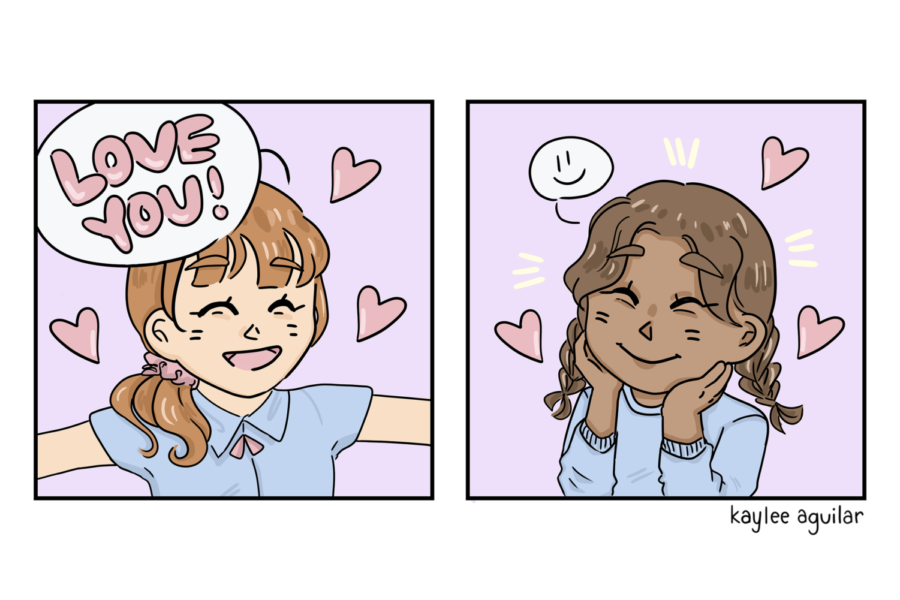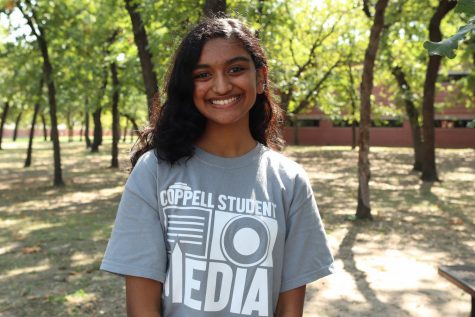Saying “I love you” should be embraced, not discouraged
The phrase “I love you” is often used to express affection for others. It can help strengthen relationships and show appreciation for loved ones. Co-student life editor Sally Parampottil thinks repeated use of the phrase in different situations strengthens its meaning rather than diminishing it.
May 14, 2019
I love saying “I love you.”
I say it to my friends and family, my classmates and peers and they always give me, at the very least, a bright smile. It makes them happy to hear. When I hear someone say they love me back, a similar feeling ensues.
Yet somehow, people find an issue with the phrase.
Critics complain I water down the meaning of the sentence whenever I say it. Some even say I do not really love everyone I say it to.
Except I do.
Love is not something specific to romantic partners or family. It has multiple layers, and, according to Greek philosophers, such as Plato and Aristotle, multiple meanings. Love can be felt for anyone and anything, and there is no reason why that feeling cannot be expressed openly.
If I can find joy in the way someone looks or acts, I cannot justify keeping that to myself. If someone’s eyes twinkle whenever they get passionate about what they are talking about at the moment, I will tell them. If someone looks like they put more effort into their outfit than they normally do, I will let them know. If someone laughs and it strikes me as beautiful, I will not hesitate to voice my opinion.
The same thing applies to saying “I love you.”
People may suggest my definition of love is too broad. In a world where people preach to be kinder towards our fellow humans, I should not be criticized for trying to spread positivity. Especially since there is no good argument for why I should not say it so often.
Some may ask what the subjects of my love have done to deserve it.
Love, at least how I see it, is not something earned. If I tell people I love them, it is not because they have worked to earn my favor, it is because I find something I love about them. I find it in their personality, in what they create and in what they say. There is no rubric for my love.
Another complaint is I diminish the importance of saying “I love you” every time I say it so openly.
While I understand how it might be odd to hear a teenager so freely tell her peers she loves them after reading romance novels where a major moment is when one tells the other they love them for the first time, love is not restricted to romance.
Love is not just a milestone later on in a romantic relationship; It is the beginning of a positive one and the continuous backbone of every moment of that relationship. It is what keeps a relationship, no matter the type, alive.
I will be a junior next year. After this year, I will see a major change in the people I will be around, as many of my friends will be taking International Baccalaureate (IB) classes. Unless they are in the same theater or Sidekick class as me, the only time I can see them is during lunch, if we are fortunate enough to have that together. One of the first friends I met after moving back to Coppell ISD is going to the University of North Texas’ Texas Academy of Math and Science (TAMS), so I will not get to see her much at all.
And while I will always regret not spending enough time with them, I will never doubt I made them feel loved, that I let them know how much I cherish them.
Japanese artist Yoko Ono said after husband John Lennon was killed, “The regret of my life is that I have not said I love you often enough.”
I may end up having a lot of regrets in my life, but not saying “I love you” enough will not be one of them.
Follow Sally (@sparampottil) on Twitter.












Tracy Tran • Feb 25, 2020 at 6:41 pm
I love you, still love you, always love you Sally!
Pramika Kadari • Feb 25, 2020 at 6:17 pm
I LOVE YOU!
Sofia Guerrero • May 16, 2019 at 11:04 pm
I love this so much Sally!! I agree, I think we can all benefit from saying “I love you” and having it said to us. I love you <3